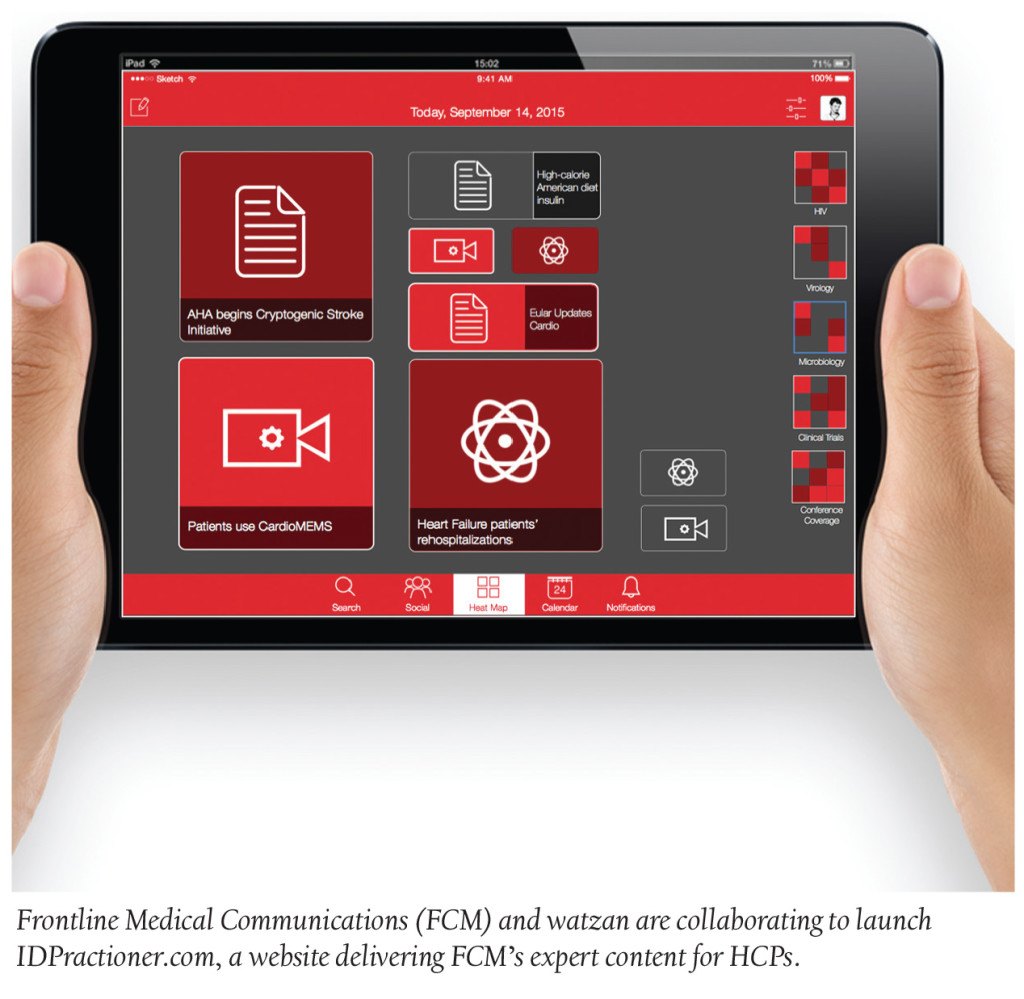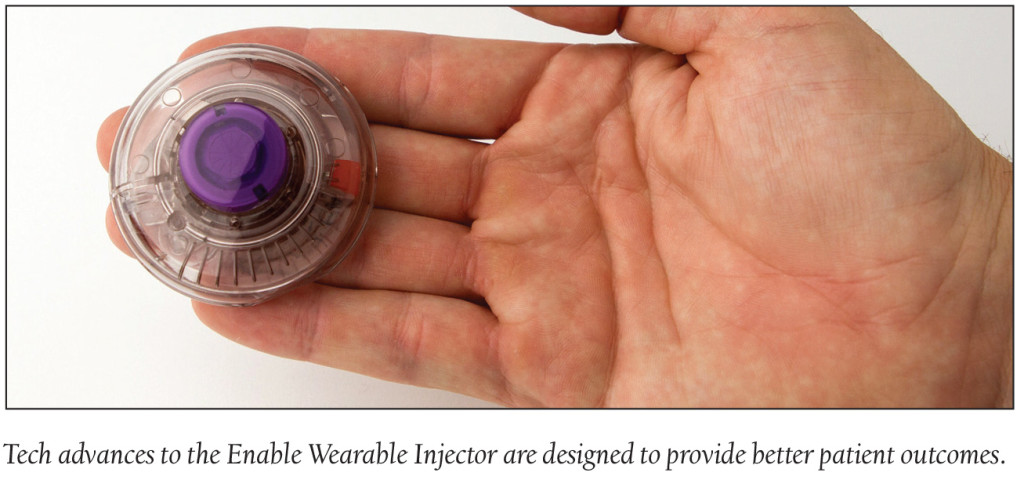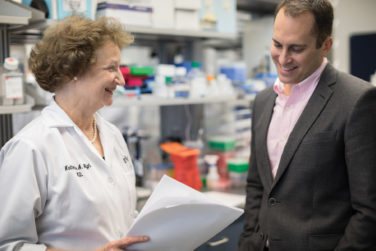TeleMed Text: First Socially Enabled Site for HCPs Coming
Slated to launch in 2016, IDPractitioner.com, a new user-based platform designed to enhance and optimize the patient-HCP relationship. IDPractitioner.com is currently in development through a partnership formed by Alan Imhoff, CEO of Frontline Medical Communications (FMC), and Charles Benaiah, CEO of watzan.
The first socially enabled site of its kind, IDPractioner.com will deliver FMC’s cutting-edge expert content through watzan’s proprietary technology, zen, which will curate for each site visitor so that each clinician can discover relevant content both quickly and easily.
Imhoff says the dynamic platform will keep HCPs updated throughout the day—and will soon announce the infectious disease physicians the site will serve. Benaiah states, “Together FMC and watzan will allow healthcare practitioners to experience great content their way.”
Therapeutic Talk: FDA Asks Pfizer to Print Birth Defect Warning on Zoloft
During the past few years, researchers have insisted that a serious link exists between infant cardiac defects and mothers who are taking Zoloft during pregnancy. According to Bloomberg, the FDA is finally acknowledging these claims and asking Pfizer, the manufacturer of the popular antidepressant, to update their label to include a warning. Pfizer is confident in the safety of their drug and notes that their label reflects this, stating that there are “no adequate and well-controlled studies of pregnant women.” The FDA remains quiet on the labeling controversy, but credible research has been used in multiple court rulings, which found that Zoloft did cause heart defects in babies while pregnant mothers properly used the antidepressant.
University of Michigan law professor, Erik Gordon, commented to Bloomberg, “Since the FDA is basically forcing them [Pfizer] to acknowledge the existence of credible studies showing Zoloft may cause heart defects, a jury could conclude they were ignoring or hiding those links to sell more of their product.”
Sales Sector: Intas Pharmaceuticals to Launch Biosimilar in U.S.
Intas Pharmaceuticals could become the first Indian drugmaker to secure a spot in the U.S. market for a biosimilar drug. The drug maker is waiting on FDA approval to start selling a biosimilar to Amgen’s white blood cell boosting drug, Neulasta. Biosimilar drugs, though cheaper to manufacture, are harder to develop than the ordinary generic version drug. The global market for biologically similar drugs is expected to reach $14 billion by 2020, Reuters says, since many popular biological drugs will be losing their protective patents. Jayesh Shah, CEO of Intas, has been selling biosimilars since 2004 and expects the new launch in the U.S. to fuel about 20% growth over the next three years. Neulasta is Amgen’s second highest selling drug, bringing in $4.6 billion in 2014. The first biosimilars were only approved in the U.S. last March, making it a brand new market with high potential for companies like Intas Pharmaceuticals.
Discoveries/Innovations: Tech Advances Enable Discreet, Simple Self-Injections
Patient self-injections can now be made more simply and discreetly through two new technological features added to the Enable Wearable Injector developed by Enable Injections, a Connecticut-based medical device company. The first new technological feature makes the product more efficient via a Bluetooth connectable, so that the med device may receive monitoring information from the mobile app. The second new feature gives the Enable Injector the ability to administer a 50 mL dosage.
The idea behind the advancements: Making it much easier for patients to take their biologicals as needed. Pharmaceutical manufacturers will benefit from the new capabilities as well: They will no longer need to formulate drugs in smaller doses for chronic patients. Patients will not only experience better outcomes when taking their medication more regularly, but hospital bills may drop without the need for drug administration procedures.
Doctors Docs: New Cancer Drug Scorecard
The American Society for Clinical Oncology (ASCO) has developed and released a rating system for cancer drugs published in the Journal of Clinical Oncology. The rating system works on a 0-100, sometimes 1-130, scale, taking into account things such as the type of cancer, side effects of the drug, and cost of treatment. The idea is for physicians and patients to discuss the score and take all aspects of the appropriate treatments into account. The physicians are asked to give feedback on the actual scorecard, so the ASCO can improve upon it.
The journal provides treatment alternatives and bases its number score primarily on value and cost. The rating system gave Johnson & Johnson’s prostate cancer therapy, Zytiga, a 42, with Sanofi’s Jevtana coming in at half of that. Astella’s Xtandi received a 32 as it is priced at $1,000 more than Zytiga. The journal has also rated plenty of drugs with very low scores, which could prove influential in the drug market. For example, Alimta, Eli Lilly’s lung cancer drug, received a zero while Roche’s Avastin was scored slightly better for the same disease with a 16. With further development, the ASCO would like to make the scorecard more user friendly, perhaps in the form of an app, so it is more accessible to patients and physicians alike.
FDA Update
Drug Approvals
Merck’s Keytruda (pembrolizumab) received accelerated approval to treat patients with advanced (metastatic) non-small cell lung cancer whose disease has progressed after other treatments and with tumors that express a protein called PD-L1. Keytruda is approved for use with a companion diagnostic, Dako North America’s PD-L1 IHC 22C3 pharmDx test, the first test designed to detect PD-L1 expression in non-small cell lung tumors.
The FDA approved Taiho Oncology’s Lonsurf (a pill that combines two drugs, trifluridine and tipiracil) for patients with an advanced form of colorectal cancer who are no longer responding to other therapies.
Alkermes’ Aristada (aripiprazole lauroxil) was approved to treat adults with schizophrenia. Aristada is administered by a healthcare professional every four to six weeks using an injection in the arm or buttocks.
After previously granting Bristol-Myers Squibb’s Opdivo (nivolumab) with a breakthrough therapy designation, the agency has officially approved the drug to treat patients with advanced (metastatic) non-small cell lung cancer whose disease progressed during or after platinum-based chemotherapy.
New Device Approvals
The FDA approved an expanded indication for the Optune System from Novocure Inc. The device is now approved to treat patients with newly diagnosed glioblastoma multiforme (GBM), an aggressive form of brain cancer.







